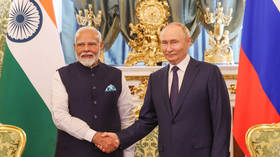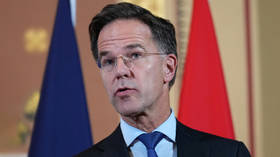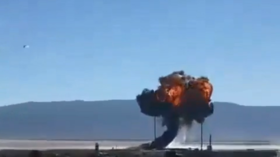Accidental allies? Saudi Arabian intel chief allegedly meets Israelis
Aside from their mutual suspicion of Iran’s nuclear program, and growing frustration with Washington, Saudi Arabia and Israel seem to have little else in common. But is it enough to form a partnership?
Are Israeli and Saudi officials heeding the ancient wisdom that says, "the enemy of my enemy is my friend?"
Saudi Deputy Defense Minister Salman bin-Sultan and two other officers are said to have paid a “secret visit” to Israel, where they “met Israeli security leaders”, according to confidential sources of the Palestinian news agency, al-Manar and Israeli radio.
"The Saudi delegation," the sources said, "met Israeli security leaders and Bin-Sultan visited one of the military Israeli bases accompanied by a senior member of the Israeli staff board."
Salman is the brother of Saudi Arabia’s intelligence head, Prince
Bandar bin-Sultan bin Abdulaziz.
However, no official comments on the reports dated Sunday
followed. The only “confirmation” of the event came from a Saudi
internet activist, who goes by the name Mujtahidd on Twitter and
publishes behind-the-scenes developments about Saudi Arabia’s
royal circle.
How much is there to this report? Israel and Saudi Arabia can
hardly be any further apart. Riyadh is firmly committed to the
cause of Palestinian statehood, a position that would seem to
preclude any sort of alliance between Israel and Saudi Arabia.
Meanwhile, Tel Aviv does not have any diplomatic relations with
Riyadh.
However, analysts see some grounds for a possible approach.
The alleged Israeli-Saudi meeting comes just weeks after P5+1
(the United States, Britain, France, Russia, China and Germany)
and Iran reached an interim agreement, in which Tehran is obliged
to halt its nuclear program in return for about $7 billion in
sanctions relief. Iranian President Hassan Rouhani, a moderate
reformer who was elected to office in August, said Iran's right
to uranium enrichment for civilian purposes had been recognized.
Israeli President Benjamin Netanyahu, at loggerheads with the
Obama administration over its willingness to negotiate with
moderate Iranian President Hassan Rouhani, slammed the Geneva
agreement as a "historic mistake." He added defiantly
that Tel Aviv would not be bound by the agreement.
Israel is not the only regional power fretting over Iran’s
alleged determination to acquire nuclear weapons, a charge that
Tehran vehemently rejects.
“I believe the main reason for the change in America’s
alliances in the Middle East is the issue of the Iranian nuclear
program, and that’s a shift in the US approach to Iran from one
of confrontation to one of containment,” Prince Khalid bin
Farhan Al-Saud, a defector from the ruling Saudi family, told RT.
“This is the main reason, even if it does come at the expense
of America’s strategic allies like Saudi Arabia and Israel.”
John Graham, a former US diplomat, gave some insight into why
Israel and Saudi Arabia are so upset with the United States.
“Israel and Saudi Arabia are very annoyed or frightened right now
because of America’s policy toward Iran,” Graham told RT.
“Obama actually called and talked on the telephone to his
counterpart, something that an American president hadn’t done in
decades. And second, the meeting in Geneva actually produced an
agreement, which looks like Iran will make significant changes in
its nuclear policy in exchange for a lessening of
sanctions.”
Washington’s change of tack with Iran is “driving Israel and
Saudi Arabia nuts,” Graham added.
So, is the union possible? On November 17, the British paper, The
Sunday Times, reported that Saudi officials had granted
permission for Israeli fighter jets to access its airspace for
possible attacks on Iran.
A Saudi foreign ministry spokesman, however, quickly rejected the
claims, saying Riyadh "has no relations or contacts with
Israel of any kind or at any level," according to the state
news agency SPA.
The statements, views and opinions expressed in this column are solely those of the author and do not necessarily represent those of RT.
The statements, views and opinions expressed in this column are solely those of the author and do not necessarily represent those of RT.













